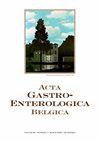Tofacitinib, celiac disease and the elderly: mind the gut!
IF 1.3
4区 医学
Q4 GASTROENTEROLOGY & HEPATOLOGY
引用次数: 0
Abstract
To the Editor, We read with great attention the interesting case report by Lenfant et al. narrating the successful use of tofacitinib in a patient with microscopic colitis and celiac disease (1), and we would point some insights about this peculiar situation. In fact, tofacitinib depicts potential side effects, including a higher risk of malignancies, and the FDA has even issued a warning about this drug’s hazard (2). Actually, a randomized open-label trial published in the New England Journal of Medicine in 2021 found that patients with rheumatoid arthritis who took tofacitinib had a higher risk of developing cancer than those who took a tumor necrosis factor (TNF) inhibitor (3). Recently, two recent randmoized controlled trials from the ORAL Surveillance Trial and published in the Annals of the Rheumatic Diseases in 2023 also contributed to shed the light on this potential risk : that patients with rheumatoid arthritis aged > 50 with cardiovascular risk who took tofacitinib had a higher risk of developing any type of cancer than those who took a TNF inhibitor (4), and secondary stratification found that they were more likely to develop cancer if they were over the age of 65 years (5). Adding insult to injury, the maligancies are also driven by the two peculiar forms of celiac disease : seronegative and refractory celiac disease (RCD), and this risk is also increased in CD diagnosed at adulthood : particularly, elder patients are prone to present a RCD, and giving immune checkpoint therapy might increase this risk (6). In conclusion, RCD ought to be definetly ruled out before starting JAK inhibitor therapy, especially in aged population with seronegative celiac disease and microscopic colitis, two well-known conditions associated with RCD.托法替尼、乳糜泻和老年人:注意肠道!
本文章由计算机程序翻译,如有差异,请以英文原文为准。
求助全文
约1分钟内获得全文
求助全文
来源期刊

Acta gastro-enterologica Belgica
Medicine-Gastroenterology
CiteScore
2.30
自引率
20.00%
发文量
78
期刊介绍:
The Journal Acta Gastro-Enterologica Belgica principally publishes peer-reviewed original manuscripts, reviews, letters to editors, book reviews and guidelines in the field of clinical Gastroenterology and Hepatology, including digestive oncology, digestive pathology, as well as nutrition. Pure animal or in vitro work will not be considered for publication in the Journal. Translational research papers (including sections of animal or in vitro work) are considered by the Journal if they have a clear relationship to or relevance for clinical hepato-gastroenterology (screening, disease mechanisms and/or new therapies). Case reports and clinical images will be accepted if they represent an important contribution to the description, the pathogenesis or the treatment of a specific gastroenterology or liver problem. The language of the Journal is English. Papers from any country will be considered for publication. Manuscripts submitted to the Journal should not have been published previously (in English or any other language), nor should they be under consideration for publication elsewhere. Unsolicited papers are peer-reviewed before it is decided whether they should be accepted, rejected, or returned for revision. Manuscripts that do not meet the presentation criteria (as indicated below) will be returned to the authors. Papers that go too far beyond the scope of the journal will be also returned to the authors by the editorial board generally within 2 weeks. The Journal reserves the right to edit the language of papers accepted for publication for clarity and correctness, and to make formal changes to ensure compliance with AGEB’s style. Authors have the opportunity to review such changes in the proofs.
 求助内容:
求助内容: 应助结果提醒方式:
应助结果提醒方式:


